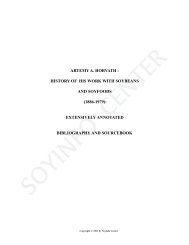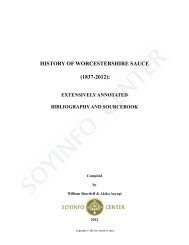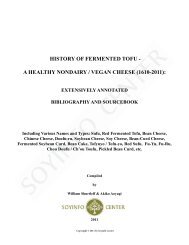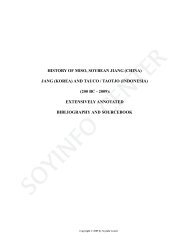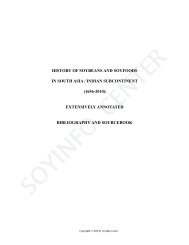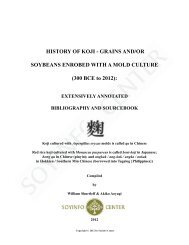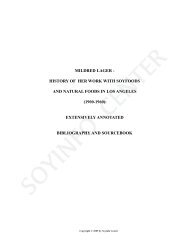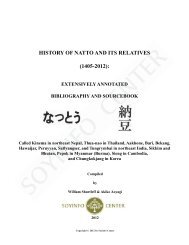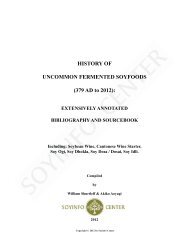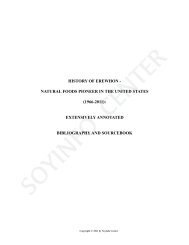history of soy yogurt, soy acidophilus milk and other ... - SoyInfo Center
history of soy yogurt, soy acidophilus milk and other ... - SoyInfo Center
history of soy yogurt, soy acidophilus milk and other ... - SoyInfo Center
Create successful ePaper yourself
Turn your PDF publications into a flip-book with our unique Google optimized e-Paper software.
egg. “Soy <strong>yogurt</strong> works a lot like whizzed t<strong>of</strong>u as an egg<br />
replacer. It makes things moist <strong>and</strong> yummy.”<br />
She uses the creative word “sammiches” instead <strong>of</strong><br />
“s<strong>and</strong>wiches.” Address: Co-host <strong>of</strong> The Post Punk Kitchen,<br />
New York City.<br />
1308. Soyfoods Association <strong>of</strong> North America. 2006.<br />
Soyfoods sales <strong>and</strong> trends (Website printout–all). www.<br />
<strong>soy</strong>foods.org/press/FAQ_sales.htm 2 p. Printed Jan. 19.<br />
• Summary: Contents: What are the recent trends in<br />
<strong>soy</strong> consumption in the U.S.? Soy sales by category:<br />
Introduction, <strong>soy</strong>-based energy bars, <strong>soy</strong><strong>milk</strong> sales, meat<br />
alternative sales, t<strong>of</strong>u sales, <strong>other</strong> <strong>soy</strong>foods sales. 2003<br />
Consumer Trends Report. Sources.<br />
“The number <strong>of</strong> new <strong>soy</strong>-based products has increased<br />
13.2% per year for the past 3 years. In 2000, approximately<br />
2,295 <strong>soy</strong>-based SKU’s were <strong>of</strong>fered; by 2002 the number<br />
hit 3,399. In 2002 there were: 580 <strong>soy</strong>-based energy bars,<br />
with 24.1% <strong>of</strong> sales [i.e. accounting for 24.1% <strong>of</strong> sales<br />
<strong>of</strong> <strong>soy</strong>foods from all categories]. 366 <strong>soy</strong>-based meal<br />
replacements & powders with 18.5% <strong>of</strong> sales. 328 <strong>soy</strong><strong>milk</strong><br />
beverages with 16.3% <strong>of</strong> sales. 318 meat alternatives with<br />
14.5% <strong>of</strong> sales. 236 t<strong>of</strong>u products with 6.8% <strong>of</strong> sales. [Other:<br />
19.8% <strong>of</strong> total sales].<br />
Soy-based energy bars: Sales reached $880 million in<br />
2002.<br />
“Soy<strong>milk</strong> sales have grown from $100 million in 1995<br />
to nearly $600 million in 2002. Soy<strong>milk</strong> has 87.3% <strong>of</strong> the<br />
nondairy beverage sales in mainstream markets. Sales <strong>of</strong><br />
refrigerated <strong>soy</strong><strong>milk</strong> grew over 100% per year for the past<br />
three years.<br />
“Meat alternative sales have grown from $114 million in<br />
1992 to over $530 million in 2002.<br />
“T<strong>of</strong>u sales have grown from 108 million in 1992 to<br />
$250 million in 2002.<br />
Other <strong>soy</strong>foods sales: Soy [fortifi ed] breakfast cereals<br />
grew to over $150 million in 2001. Soy <strong>yogurt</strong> sales grew<br />
by 66.9% in 2001 to reach $23.7 million. Soy-based cheese<br />
alternatives grew at 11.6% in 2001 to reach $57.6 million.<br />
Sales <strong>of</strong> <strong>soy</strong>-based frozen desserts rose 39.9% in 2001 to<br />
reach $42.2 million. Address: 1001 Connecticut Ave., NW,<br />
Suite 1120, Washington, DC 20036. Phone: 202-659-3520.<br />
1309. Nordquist, Ted; Webster, Robin. 2006. New<br />
developments making dairylike <strong>soy</strong>foods in America<br />
(Interview). SoyaScan Notes. May 9. Conducted by William<br />
Shurtleff <strong>of</strong> Soyfoods <strong>Center</strong>.<br />
• Summary: WholeSoy & Co. is a wholly-owned subsidiary<br />
<strong>of</strong> TAN Industries; Ted now prefers to used the former name<br />
instead <strong>of</strong> the latter. Modesto WholeSoy Co. is its own entity.<br />
Ted <strong>and</strong> his business partner, Henry, now own 85% <strong>of</strong> the<br />
stock.<br />
Silk <strong>soy</strong><strong>milk</strong> was launched in Jan. 1996. Ted was having<br />
a lot <strong>of</strong> problems with the <strong>soy</strong> base made by Pacifi c ProSoya<br />
HISTORY OF SOY YOGURT & CULTURED SOYMILK 506<br />
© Copyright Soyinfo <strong>Center</strong> 2012<br />
in British Columbia. About a year later [probably in about<br />
March 1997] Ted installed a <strong>soy</strong> base plant at Soyfoods <strong>of</strong><br />
America in Duarte, California. He did this together with<br />
Wally Rogers, owner <strong>of</strong> Bean Machine Inc. (BMI–using<br />
a stainless steel grinder / disintegrator made for BMI by<br />
Corenco, owned by Chris Cory). Wally took Ted to Chris<br />
<strong>and</strong> together they designed the grinders to be installed<br />
at Soyfoods <strong>of</strong> America. In about Sept. 1997 Ted started<br />
producing <strong>soy</strong> base for Silk <strong>soy</strong><strong>milk</strong> at the plant in Duarte.<br />
This <strong>soy</strong> base was sent in tankers from Duarte to Gustine,<br />
where Ted <strong>and</strong> coworkers formulated the Silk <strong>soy</strong><strong>milk</strong>.<br />
Ted’s next product was made together with Gary Stein.<br />
Gary (<strong>of</strong> San Diego) called Ted <strong>and</strong> said that Trader Joe’s<br />
wanted a <strong>soy</strong><strong>milk</strong>. Ted said to Gary, “That’s fi ne, but I have a<br />
contract with Steve Demos, so I can’t do that.” So Ted set up<br />
Gary. He told Gary that Ann Shaw <strong>and</strong> Laura Tewnion knew<br />
how to formulate <strong>soy</strong><strong>milk</strong>. He <strong>and</strong> Gary talked a lot about<br />
it but he told Gary, “I can’t touch it with a ten foot pole, but<br />
I’m happy to ship the <strong>soy</strong> base to you.” So Ted shipped the<br />
<strong>soy</strong> base from Duarte to Gustine, then Gary Stein formulated<br />
the <strong>soy</strong><strong>milk</strong> for Trader Joe’s <strong>and</strong> sold it to Trader Joe’s.<br />
Ted’s next product was Certifi ed Organic Soy<strong>milk</strong>, made<br />
for Wildwood Natural Foods <strong>and</strong> launched in July 1998.<br />
Next, in 1999, Ted <strong>and</strong> Henry came up with the<br />
WholeSoy name. So they had cups designed for WholeSoy<br />
but, <strong>of</strong> course, they had no sales volume, so they sent that<br />
idea to Trader Joe’s, which agreed for Ted to private label<br />
the product for Trader Joe’s. So Ted launched both the<br />
WholeSoy <strong>and</strong> the Trader Joe’s private label at exactly the<br />
same time. They were exactly the same products but in<br />
different cups.<br />
In about May 2004 changed the name <strong>of</strong> his company<br />
to WholeSoy & Co. from TAN Industries, <strong>and</strong> his br<strong>and</strong><br />
to WholeSoy & Co. from The WholeSoy Co. The words<br />
“WholeSoy & Co.” fi rst appeared on their Lite Smoothies<br />
in September 2004. Ted did a focus group in which he put<br />
out packaging from products made by Silk [White Wave],<br />
Stonyfi eld, Wildwood, <strong>and</strong> TAN Industries. The members <strong>of</strong><br />
the focus group were asked to describe what they understood<br />
by looking at the different packages. “They thought that<br />
WholeSoy was a generic name, that companies like Safeway<br />
<strong>and</strong> Albertsons were making. They thought WholeSoy was a<br />
really big corporation, <strong>and</strong> that therefore its products should<br />
sell for the lowest price.” Ted recalls: “It was unbelievable.<br />
I was just speechless. I wanted to go in there <strong>and</strong> tell them<br />
how wrong they were!” They knew the Stonyfi eld br<strong>and</strong> <strong>and</strong><br />
thought that product was worth the money. The Wildwood<br />
product attracted them because <strong>of</strong> it had a real good<br />
appearance.”<br />
In about Jan. 2006 Ted started printing “Soy Yogurt” in<br />
large letters on the front <strong>of</strong> his <strong>yogurt</strong> cups–which previously<br />
said only “Cultured Soy.” It happened like this. Ted’s <strong>soy</strong><br />
<strong>yogurt</strong> is made by SSI (Super Store Industries), which is<br />
owned by Raley’s <strong>and</strong> Save Mart (both supermarket chains).



